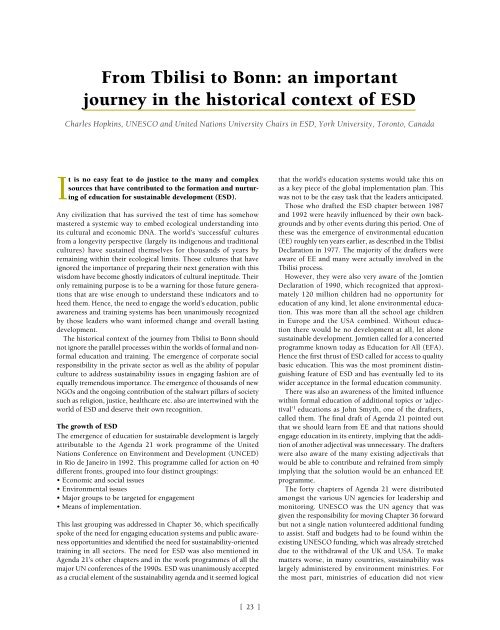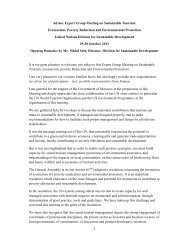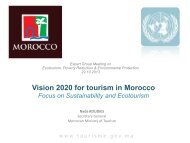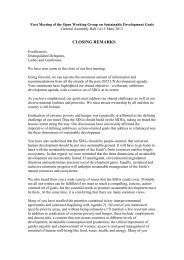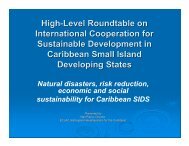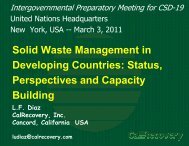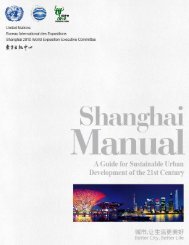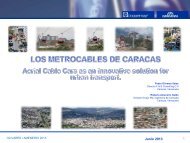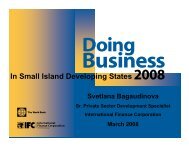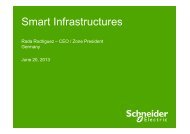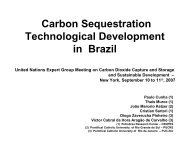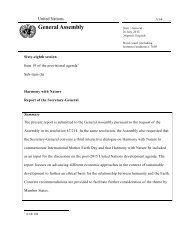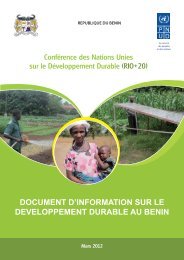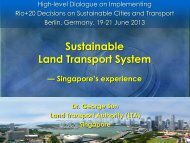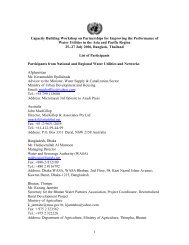Tomorrow today; 2010 - unesdoc - Unesco
Tomorrow today; 2010 - unesdoc - Unesco
Tomorrow today; 2010 - unesdoc - Unesco
You also want an ePaper? Increase the reach of your titles
YUMPU automatically turns print PDFs into web optimized ePapers that Google loves.
From Tbilisi to Bonn: an important<br />
journey in the historical context of ESD<br />
Charles Hopkins, UNESCO and United Nations University Chairs in ESD, York University, Toronto, Canada<br />
It is no easy feat to do justice to the many and complex<br />
sources that have contributed to the formation and nurturing<br />
of education for sustainable development (ESD).<br />
Any civilization that has survived the test of time has somehow<br />
mastered a systemic way to embed ecological understanding into<br />
its cultural and economic DNA. The world’s ‘successful’ cultures<br />
from a longevity perspective (largely its indigenous and traditional<br />
cultures) have sustained themselves for thousands of years by<br />
remaining within their ecological limits. Those cultures that have<br />
ignored the importance of preparing their next generation with this<br />
wisdom have become ghostly indicators of cultural ineptitude. Their<br />
only remaining purpose is to be a warning for those future generations<br />
that are wise enough to understand these indicators and to<br />
heed them. Hence, the need to engage the world’s education, public<br />
awareness and training systems has been unanimously recognized<br />
by those leaders who want informed change and overall lasting<br />
development.<br />
The historical context of the journey from Tbilisi to Bonn should<br />
not ignore the parallel processes within the worlds of formal and nonformal<br />
education and training. The emergence of corporate social<br />
responsibility in the private sector as well as the ability of popular<br />
culture to address sustainability issues in engaging fashion are of<br />
equally tremendous importance. The emergence of thousands of new<br />
NGOs and the ongoing contribution of the stalwart pillars of society<br />
such as religion, justice, healthcare etc. also are intertwined with the<br />
world of ESD and deserve their own recognition.<br />
The growth of ESD<br />
The emergence of education for sustainable development is largely<br />
attributable to the Agenda 21 work programme of the United<br />
Nations Conference on Environment and Development (UNCED)<br />
in Rio de Janeiro in 1992. This programme called for action on 40<br />
different fronts, grouped into four distinct groupings:<br />
• Economic and social issues<br />
• Environmental issues<br />
• Major groups to be targeted for engagement<br />
• Means of implementation.<br />
This last grouping was addressed in Chapter 36, which specifically<br />
spoke of the need for engaging education systems and public awareness<br />
opportunities and identified the need for sustainability-oriented<br />
training in all sectors. The need for ESD was also mentioned in<br />
Agenda 21’s other chapters and in the work programmes of all the<br />
major UN conferences of the 1990s. ESD was unanimously accepted<br />
as a crucial element of the sustainability agenda and it seemed logical<br />
that the world’s education systems would take this on<br />
as a key piece of the global implementation plan. This<br />
was not to be the easy task that the leaders anticipated.<br />
Those who drafted the ESD chapter between 1987<br />
and 1992 were heavily influenced by their own backgrounds<br />
and by other events during this period. One of<br />
these was the emergence of environmental education<br />
(EE) roughly ten years earlier, as described in the Tbilisi<br />
Declaration in 1977. The majority of the drafters were<br />
aware of EE and many were actually involved in the<br />
Tbilisi process.<br />
However, they were also very aware of the Jomtien<br />
Declaration of 1990, which recognized that approximately<br />
120 million children had no opportunity for<br />
education of any kind, let alone environmental education.<br />
This was more than all the school age children<br />
in Europe and the USA combined. Without education<br />
there would be no development at all, let alone<br />
sustainable development. Jomtien called for a concerted<br />
programme known <strong>today</strong> as Education for All (EFA).<br />
Hence the first thrust of ESD called for access to quality<br />
basic education. This was the most prominent distinguishing<br />
feature of ESD and has eventually led to its<br />
wider acceptance in the formal education community.<br />
There was also an awareness of the limited influence<br />
within formal education of additional topics or ‘adjectival’<br />
1 educations as John Smyth, one of the drafters,<br />
called them. The final draft of Agenda 21 pointed out<br />
that we should learn from EE and that nations should<br />
engage education in its entirety, implying that the addition<br />
of another adjectival was unnecessary. The drafters<br />
were also aware of the many existing adjectivals that<br />
would be able to contribute and refrained from simply<br />
implying that the solution would be an enhanced EE<br />
programme.<br />
The forty chapters of Agenda 21 were distributed<br />
amongst the various UN agencies for leadership and<br />
monitoring. UNESCO was the UN agency that was<br />
given the responsibility for moving Chapter 36 forward<br />
but not a single nation volunteered additional funding<br />
to assist. Staff and budgets had to be found within the<br />
existing UNESCO funding, which was already stretched<br />
due to the withdrawal of the UK and USA. To make<br />
matters worse, in many countries, sustainability was<br />
largely administered by environment ministries. For<br />
the most part, ministries of education did not view<br />
[ 23 ]


